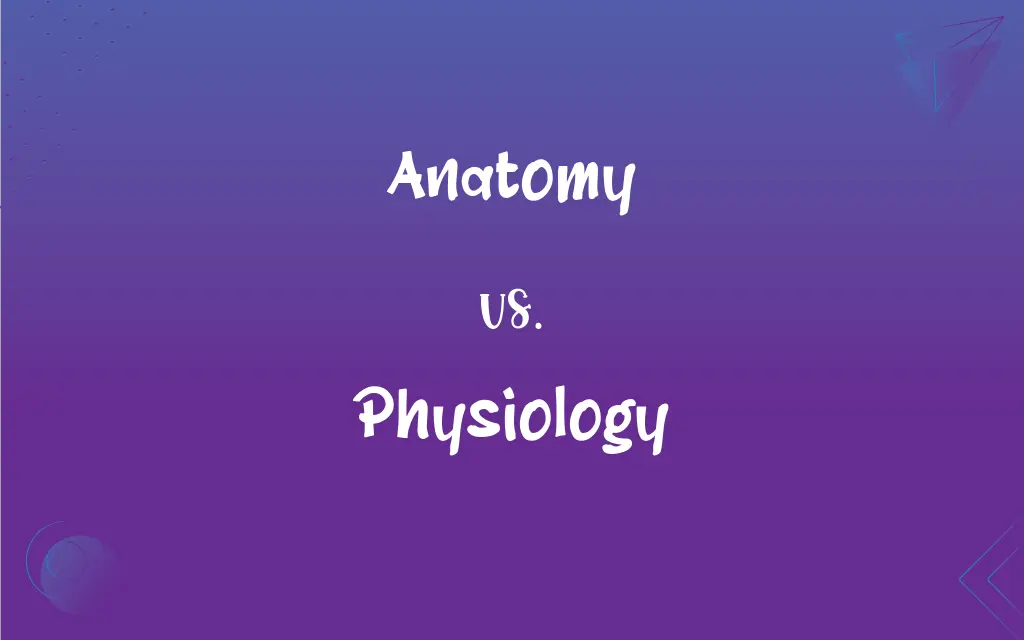Anatomy vs. Physiology: What's the Difference?
Edited by Aimie Carlson || By Harlon Moss || Updated on October 27, 2023
Anatomy is the study of the physical structure of organisms, while physiology examines the functions and processes of the living parts.

Key Differences
Anatomy and physiology are intertwined fields of study within biology, both crucial for understanding living organisms, but they approach this understanding from different angles. Anatomy, from the Greek word 'anatomia', meaning 'dissection', is the branch of biology that deals with the structure of organisms and their parts. Physiology, on the other hand, is derived from the Greek word 'physiologia', which means 'study of nature' or 'study of natural order'. It focuses on the functions and mechanisms occurring within a living system. Essentially, anatomy gives us a map of the physical landscape of the body, whereas physiology provides insight into how those physical structures function and interact.
While anatomy delves into the physical form, exploring organs, bones, muscles, and other structures, physiology seeks to understand the chemical and biological processes that make these structures operate. In essence, anatomy is about the 'what' and 'where' in a living organism; it is the study of the physical and spatial properties of organisms. Physiology, in contrast, addresses the 'how' and 'why'; it looks into the metabolic pathways, interactions, and regulatory mechanisms that enable an organism to function. Anatomy can be seen as the framework on which physiology operates, with each field complementing and enhancing the understanding of the other.
When studying anatomy, one might examine the physical attributes of the heart, understanding its chambers, valves, and the pathways of blood vessels. In contrast, physiology would explore how the heart pumps blood, how it responds to physical activity, and how it interacts with other bodily systems. Anatomy provides a detailed map of where everything is located, a necessary foundation for understanding the complexities that physiology unravels. Physiology, then, is the dynamic aspect, explaining the operations and interactions within the anatomical structures. Together, anatomy and physiology provide a comprehensive picture of an organism's form and function.
Anatomy often involves dissection and the use of imaging technologies to visualize structures within the body. It lays out the blueprint of the body, showing where organs and systems are positioned and how they are physically connected. Physiology, conversely, may involve experiments and measurements to understand processes such as nerve impulses, muscle contractions, or hormonal regulation. While anatomy could be likened to the architecture of a building, showing its layout and structural design, physiology would be akin to understanding the building's utilities and systems, explaining how electricity, water, and air conditioning systems function within that structure.
Both anatomy and physiology are foundational to the medical field, contributing to our understanding of health and disease. Anatomy allows healthcare professionals to know where to perform a surgery or how to navigate the complexities of the human body, while physiology helps in understanding disease mechanisms, how medications work, and how the body maintains homeostasis. In conclusion, while anatomy provides the structural details of living organisms, physiology brings these structures to life by explaining their function, with both disciplines being integral to the full understanding of biology and medicine.
ADVERTISEMENT
Comparison Chart
Definition
Study of structure of organisms
Study of functions of living parts
Method
Dissection, observation
Experiments, measurements
Objective
Identify and describe parts
Explain how parts work
Subfields
Histology, embryology
Neurophysiology, cardiovascular phys.
Relation
Provides form
Explains function
ADVERTISEMENT
Anatomy and Physiology Definitions
Anatomy
Branch of Science.
Anatomy is a fundamental subject in medical education.
Physiology
Biological Function.
Physiology explains how the heart beats.
Anatomy
Body Part Description.
The anatomy of the heart is complex.
Physiology
Biophysical Processes.
Exercise physiology examines muscle responses.
Anatomy
Dissection Study.
In class, we explored the anatomy of a frog.
Physiology
Organ System Working.
Renal physiology involves studying kidney functions.
Anatomy
Morphology.
The anatomy of birds is adapted for flight.
Physiology
Cellular Functions.
Plant physiology includes photosynthesis mechanisms.
Anatomy
Physical Structure.
They studied the anatomy of the human brain.
Physiology
Science of Life Processes.
Physiology is crucial in understanding health.
Anatomy
The bodily structure of a plant or an animal or of any of its parts.
Physiology
The biological study of the functions of living organisms and their parts.
FAQs
Does physiology require knowledge of chemistry?
Yes, understanding biochemical processes is important.
Is physiology limited to internal functions?
No, it also involves external functions like muscle movement.
Does anatomy require a microscope?
For microanatomy or histology, yes.
Is dissection essential in anatomy?
Traditionally yes, but alternatives like 3D models exist.
Does physiology change with age?
Yes, as bodily functions can change over a person’s lifetime.
Are anatomy and physiology always studied together?
Often, as they complement each other, but can be separate.
Can anatomy be affected by diseases?
Diseases can alter anatomical structures.
Can physiology explain diseases?
Yes, by showing how normal functions are disrupted.
Can physiology be observed directly?
Often indirectly, through tests and measurements.
Is physiology only about human bodies?
No, it also includes animal and plant physiology.
Can technology advance physiology?
Absolutely, through new techniques and equipment.
Does physiology include mental functions?
Yes, in fields like neurophysiology.
Can anatomy and physiology predict health outcomes?
To some extent, by understanding structure and function.
Is anatomy just about human bodies?
No, it can also involve animals and other organisms.
Can anatomy change over time?
Generally not, except in cases like evolution or development.
Is physiology a dynamic field?
Yes, as it involves ongoing functions and changes.
Are there specialized fields in anatomy?
Yes, like neuroanatomy and comparative anatomy.
Is anatomy foundational to surgery?
Yes, understanding anatomy is crucial for surgeons.
Are anatomical terms universal?
Generally, they follow standardized international terminology.
Do anatomy studies involve living specimens?
Usually not, it primarily involves dissection of deceased specimens.
About Author
Written by
Harlon MossHarlon is a seasoned quality moderator and accomplished content writer for Difference Wiki. An alumnus of the prestigious University of California, he earned his degree in Computer Science. Leveraging his academic background, Harlon brings a meticulous and informed perspective to his work, ensuring content accuracy and excellence.
Edited by
Aimie CarlsonAimie Carlson, holding a master's degree in English literature, is a fervent English language enthusiast. She lends her writing talents to Difference Wiki, a prominent website that specializes in comparisons, offering readers insightful analyses that both captivate and inform.
































































